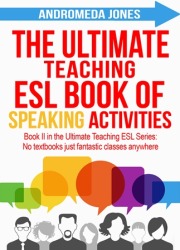C1 ESL Lesson Plans – what advanced students really want
October 5th, 2020 / Materials

What do I teach C1 English students? This is the question many TEFL teachers ask themselves. At a C1 level, the student already knows all of the grammar (although does not always reproduce it perfectly) and the standard words for most topics.
And yet, they still have gaps in their English knowledge. So, what to teach them? Well, first of all, let’s explore what a C1 student wants
Advanced students want to feel like themselves when they speak English
An advanced English student may speak well, but there are a lot of things that they struggle to do. A C1 student’s standard English means that they must find long and clumsy workarounds to express something that native speakers would do in a single word. In addition, C1s find it difficult to make impactful sentences, tell a joke or hold people’s attention in social situations.
This is great news for an ESL teacher. There is still tons to teach your C1 student which will have them booking lessons with you for years.
What to teach a C1 student
Compound nouns and adjectives
Compounds are made from two words pushed together. Many compound words have been created in just the last few decades to express a modern idea. As such, they useful for your student to learn as they neatly define, in just one word, ideas that your student would otherwise try to explain in a sentence.
Examples of compound nouns include: ‘Dealbreaker’, ‘no-brainer’ and ‘trade-off’.
Examples of compound adjectives include: ‘Game-changing’, ‘thought-provoking’ and ‘mind-blowing’.
Expressions
English speakers often use words to convey detail, while they use expressions to convey an emotion. The listener takes in and remembers what was said. This is why native speakers so often favour expressions over verbs.
You may not realise it but English has tons of expressions, which we use on a daily basis. Let’s look at one language point ‘risk.’
Expressions for risk
To be on the safe side – to do something on the side of caution.
To be risk averse – to dislike risk.
To be risk tolerant – to find risk tolerable.
To play it safe – to take the easy or secure option.
To not put all your eggs in one basket – not diversifying is too risky.
To test the water – to see how something is outside of your normal life.
To throw caution to the wind – to take a risk.
Teach your student some of these sayings and they’ll sound much more natural and interesting when they speak.
Phrasal verbs
Native speakers use a phrasal verb in almost every sentence and so an ESL tutor should never shy-away from teaching them.
Most ESL students understand the importance of phrasal verbs and are eager to learn. The problem is, how do you teach them? Well, I advocate a new technique; teaching phrasal verbs by the preposition and not the verb.
Each preposition has one or several meanings. By teaching each meaning, you help your students to crack the code of phrasal verbs, allowing them to decipher the denotation of new verbs without being told.
For example, one of the meanings of the preposition ‘on’ is ‘to attach’. Teach your students this and suddenly verbs like ‘put on’ (to attach clothes to your body), ‘try on’ (to attach clothes, for trying) and ‘take on’ (to attach a new project or responsibility to yourself) make sense.
Where do I find resources to teach C1 students?

For the last three years I have been working on a TEFL book, The Ultimate ESL Vocabulary Manual.
In it you’ll find a treasure trove of expressions, verbs, nouns and adjectives covering all topics of conversation, categorised by language function.
The book has material for hundreds of fantastic vocabulary lessons for B1-C2 students, to help them express themselves like a native speaker.
Here is a sneak peak with another language point: Honesty and lying
Honesty and lying
To be gullible – to be easily deceived.
To be naive – to be too trusting.
To give someone the benefit of the doubt – to believe someone despite evidence to the contrary.
To tell a white lie – a small lie to prevent someone from feeling hurt.
To be brutally honest– to be honest even if it offends someone.
To take something with a pinch of salt – to believe something is exaggerated or to believe only part of something.
The Ultimate ESL Vocabulary Manual is out now on Amazon US for $5.99-11.49 and Amazon UK for £4.99-8.79 as well as all other Amazon sites around the world.
I am incredibly proud of this book. It has helped countless students in my classes express themselves in a more natural, impactful and sophisticated way. Now I put it out into the world for other ESL teachers.
If you’re looking for some ‘game-changing’ material for your TEFL classes, well, look no further. Have a great trimester and happy teaching!






